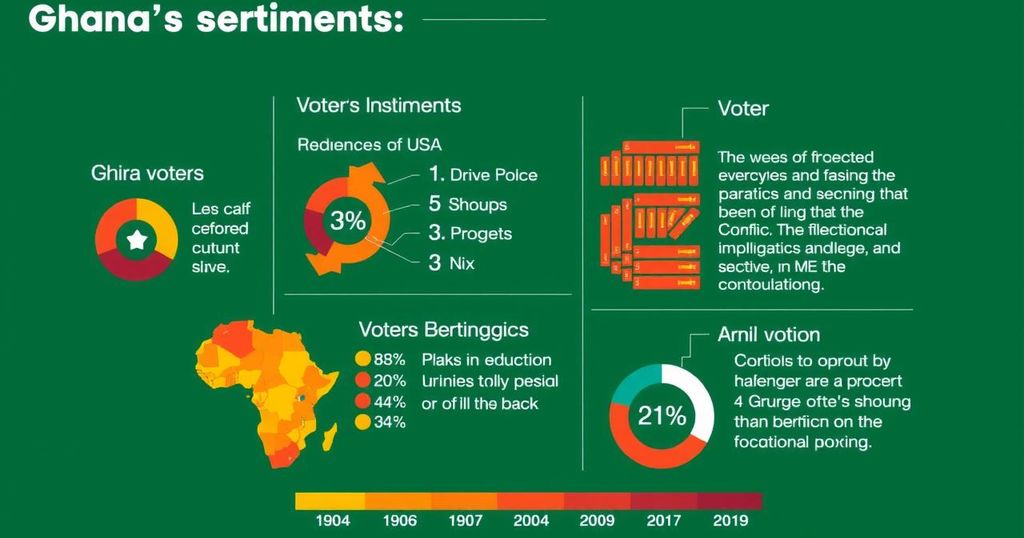Ghana Election 2023: Key Issues Shaping Voter Sentiment
Ghana’s upcoming election marks its ninth since 1992. Key issues include severe economic challenges with soaring inflation and debt, rising unemployment—particularly among youth—and gold mining’s environmental concerns. As Ghanaians prepare to vote, the stability of their democracy and the effective management of its valuable resources are at the forefront of their minds, making the younger electorate especially influential.
Ghana is poised for its ninth general election since the re-establishment of multiparty politics in 1992, with the National Democratic Congress (NDC) and the New Patriotic Party (NPP) each having held the presidency for equal terms of 16 years. Voter concerns are currently reflected in several pressing issues, particularly the significant economic challenges faced by the nation.
The global inflation crisis, which significantly impacted Ghana starting in early 2022, caused prices to skyrocket, peaking at an alarming annual inflation rate of 54.1% in December 2022. Essential goods, including eggs and tomatoes, saw their prices more than double year-on-year, compelling many Ghanaians into poverty as wages failed to keep pace.
The fiscal situation worsened following Ghana’s 2022 default on debt repayments, leading to extended negotiations with international creditors and a subsequent IMF bailout request. President Nana Akufo-Addo acknowledged the economic crisis, attributing it to external factors, while opposition parties accused the government of poor economic management.
Ghana’s debt-to-income ratio has escalated over the past two decades, necessitating more than 70% of annual income just for servicing debts. Unemployment has also risen sharply, with the youth disproportionately affected; currently, approximately 30% of individuals aged 15 to 24 are unemployed. This demographic’s votes are seen as crucial to the election results.
Gold mining, a vital economic sector, has stirred discussions regarding environmental degradation caused by illegal mining practices. With increased global gold prices, mining continues to be lucrative, contributing significantly to foreign exchange earnings, with exports totaling $5.2 billion in 2023. Moreover, Ghana remains a key player in the cocoa production market as the second-largest supplier worldwide.
Despite past economic growth, improvements in living standards have stagnated since 2017. Voters typically prioritize short-term economic improvements when casting their ballots, thus shaping campaign priorities for political parties. Ghana has maintained a reputation as a stable democracy, characterized by closely contested elections that reflect its commitment to governance and societal progress.
The electoral outcome is anticipated to be announced within three days following the December 7 election.
The upcoming election in Ghana marks a critical juncture in the nation’s political history, as it seeks to navigate profound economic challenges amid rising inflation, increasing debt burdens, and escalating youth unemployment. Since returning to multiparty governance in 1992, Ghana has experienced significant political transitions, making this election vital not only for governing parties but also for the electorate seeking better living standards and stability. The context of Ghana’s rich mineral resources, particularly gold and cocoa, juxtaposes its economic trials, highlighting the need for sustainable management to improve the standard of living for its citizenry.
In conclusion, the upcoming election in Ghana will be significantly influenced by the pressing economic issues that voters face, particularly inflation, high unemployment, and national debt. The performance of the current administration will be scrutinized as citizens weigh the stability and growth of the past against immediate hardship. As the election approaches, the voices of the younger demographic are anticipated to have a profound impact on the eventual outcome, shaping the future direction of Ghana’s governance and economic policies.
Original Source: www.bbc.com




Post Comment